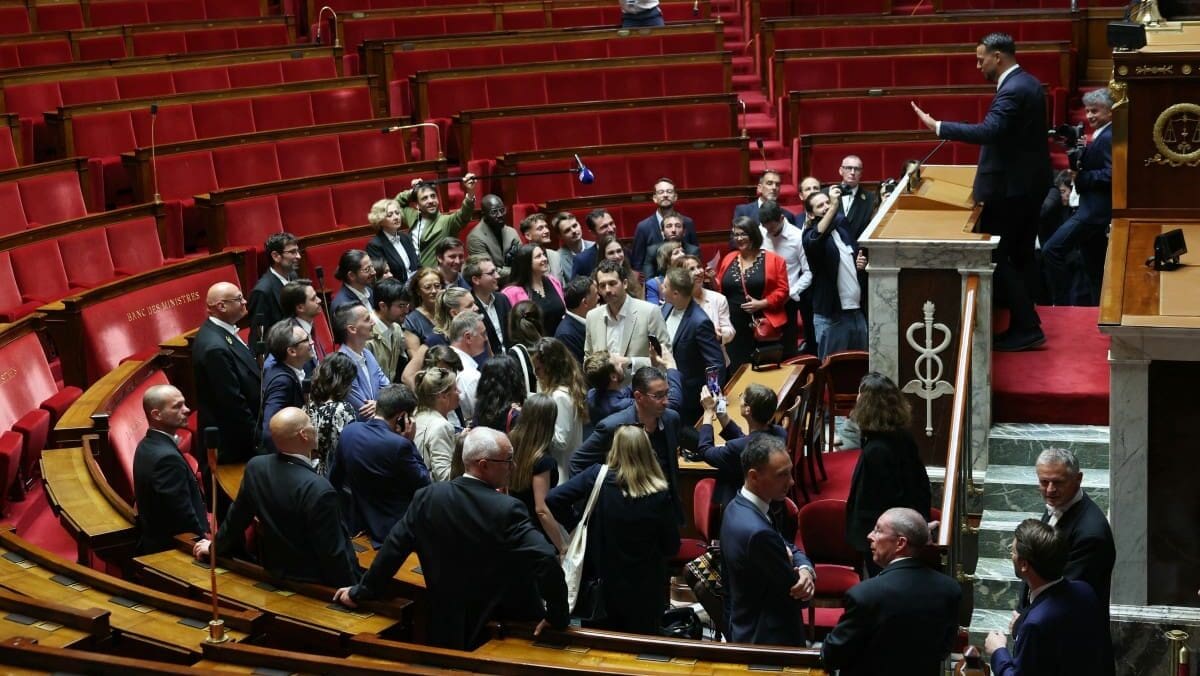
French newly-elected Member of Parliament (MP) for the La France Insoumise (LFI) party of the leftist coalition “Nouveau Front Populaire” (New Popular Front – NFP) Sebastien Delogu (R) speaks to newly-elected Members of Parliament (MP) gathered at France’s National Assembly in Paris on July 9, 2024.
Photo: ALAIN JOCARD / AFP
A week after the second round of parliamentary elections failed to produce a clear majority, France is still waiting for a new government. The left-wing coalition, which came out on top in terms of number of seats, is tearing itself apart trying to find a consensus candidate for prime minister. President Emmanuel Macron, meanwhile, is ploughing his own furrow with no sign of wanting to work with them. The discredit of the French Left risks becoming deeply entrenched.
The left-wing coalition known as the New Popular Front (NFP) managed to win 178 seats with just over 7 million votes, beating the Macronist coalition (150 seats) and the Rassemblement National (RN) and its allies (142 seats). On the strength of this apparent success, the NFP believes it is entitled to form the new government. The problem is that its constituent parties are unable to agree on a candidate for the post.
For the past week, intense negotiations have been taking place between the headquarters of the parties concerned: the communist and socialist parties, the Greens, and La France Insoumise (LFI).
The leading party in the coalition is La France Insoumise. However, its leader, Jean-Luc Mélenchon, is attracting strong criticism from both Left and Right for his excesses and ambiguous attitude towards Hamas, which justifies accusations of antisemitism. Presented as a deterrent, his candidacy has been rejected by his allies. Party representatives are annoyed by his supporters’ insistence on pushing for Mélenchon: “LFI is blocking everything, they’re irresponsible people who can’t live up to expectations. They’re bringing out Mélenchon, it’s unbearable,” said a socialist to France Info.
In the space of a few days, a name emerged that was totally unknown to the public: Huguette Bello, president of the Réunion region in the Indian Ocean. The communist party and La France Insoumise managed to agree on her profile, but the choice was not validated by the socialist party, forcing her to give up.
The socialists would prefer to put forward the party’s current secretary general, Olivier Faure. The Greens, for their part, are playing the neutrality card, which is just as irritating to their partners: “The Greens are going to have to get out of their holiday camp leader language and take a stand,” one representative vituperated to France Info. On Monday afternoon, July 15th, the LFI representatives announced their intention to suspend their participation in the negotiations. In response, the socialist party announced in a press release that, together with the communist party and the Greens, it had reached a “proposal for a joint candidacy from civil society for the post of Prime Minister.”
While the discussions concern the imminent appointment of the prime minister, the real issues are further away. Everyone has the presidential elections of 2027 in mind. La France Insoumise has an interest in obstructing and pushing the socialists and ecologists to join forces with the Macronists to form a grand centre-left coalition. This strategy would enable them to undermine their partners’ credibility and present themselves as the only true Left with a view to the presidential election.
The NFP had undertaken to propose the name of a prime minister before the evening of July 14th. It failed to do so and is now putting forward a new date, July 18th, to concentrate on another matter—the election of the president of the national assembly.
For the moment, the internal negotiations within the NFP seem to have had no impact on the path followed by President Macron. He is due to accept the resignation of current Prime Minister Gabriel Attal on Tuesday, July 16th. Gabriel Attal was elected MP, and appointed leader of the Ensemble pour la République parliamentary group (the new name for the Macronist camp). He currently combines the functions of prime minister and representative in the National Assembly, which is prohibited by the Constitution in the name of the separation of powers. Seventeen other ministers are currently in the same situation, but this does not seem to be troubling Emmanuel Macron.
As for the election of management positions in the National Assembly, Macron’s deputies stated that they wished at all costs to avoid the election to these key positions of members of the RN or La France Insoumise. This means they are simply abstaining to avoid having to vote for one or the other. The situation of deadlock and lack of dialogue between the political forces is not about to be resolved.
